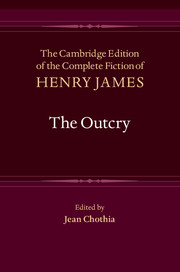Book contents
- Frontmatter
- Contents
- Illustrations
- Acknowledgments
- Abbreviations
- General Editors’ Preface
- General Chronology of James’s Life and Writings
- Introduction
- Textual Introduction
- Chronology of Composition and Production
- Bibliography
- The Outcry
- Book First
- Book Second
- Book Third
- Glossary of Foreign Words and Phrases
- Notes
- Textual Variants
- Emendations
- Appendices
Textual Introduction
Published online by Cambridge University Press: 11 April 2021
- Frontmatter
- Contents
- Illustrations
- Acknowledgments
- Abbreviations
- General Editors’ Preface
- General Chronology of James’s Life and Writings
- Introduction
- Textual Introduction
- Chronology of Composition and Production
- Bibliography
- The Outcry
- Book First
- Book Second
- Book Third
- Glossary of Foreign Words and Phrases
- Notes
- Textual Variants
- Emendations
- Appendices
Summary
There was just one lifetime edition of The Outcry. It was published in October 1911, by Methuen, London, and Charles Scribner's Sons, New York. James corrected the proofs of the novel for Scribner's immediately before leaving America in August 1911 and requested the corrected proofs be sent via his agent, Pinker, to Methuen who published on 5 October. Although Scribner's agreed simultaneous publication, their earlier intended date, ‘September 1911’, remains on the fly-leaf of the volume that was released on 8 October. Methuen 1911 is the copy text for this edition. While some punctuation differences between the two editions – the insertion of commas to indicate parentheses and a hyphen in ‘Thank-you!’ – might well be house style, the claim in the Library of America’s ‘Note on the Texts’ that, although there are minor differences in spelling and punctuation, ‘there are no variations in wording’ (N1903–11 1183) is not quite correct: an occasional word or phrase is different. It is unclear when these differences arose but alterations may well have been made by James after he arrived back in England. Certainly, he told Pinker on 10 August that, although Scribner's had been asked to send a paged copy direct to Methuen, he ‘should still like to see his proof’ and asked his agent to arrange this. Michael Anesko has suggested that slight differences of vocabulary between the English and American versions of James's novels demonstrate his ‘concern for “verisimilitude” and his awareness of two distinct markets for his work’. Such evidently authorial differences include: ‘fête’ in Scribner's appearing as ‘feast’ in Methuen and ‘the young man said’ as ‘said this observer’. Where darkness ‘seemed to clear’ in Scribner’s, it ‘seemed to drop’ in Methuen. In single instances, ‘it’ appears as ‘this’, ‘can't not’ as ‘can't but’, ‘grandmother’ as ‘ancestress’, ‘newspaper’ as ‘newspapers’, ‘our thing’ as ‘the thing’ and ‘a long moment’ as ‘a very long moment’. There is one change to word order when ‘as for positively’ in Scribner's reads ‘as positively for’ in Methuen. Variants between the Methuen and Scribner's texts are listed at the beginning of the Textual Variants section.
- Type
- Chapter
- Information
- The Outcry , pp. lxvii - lxxiiPublisher: Cambridge University PressPrint publication year: 2016



